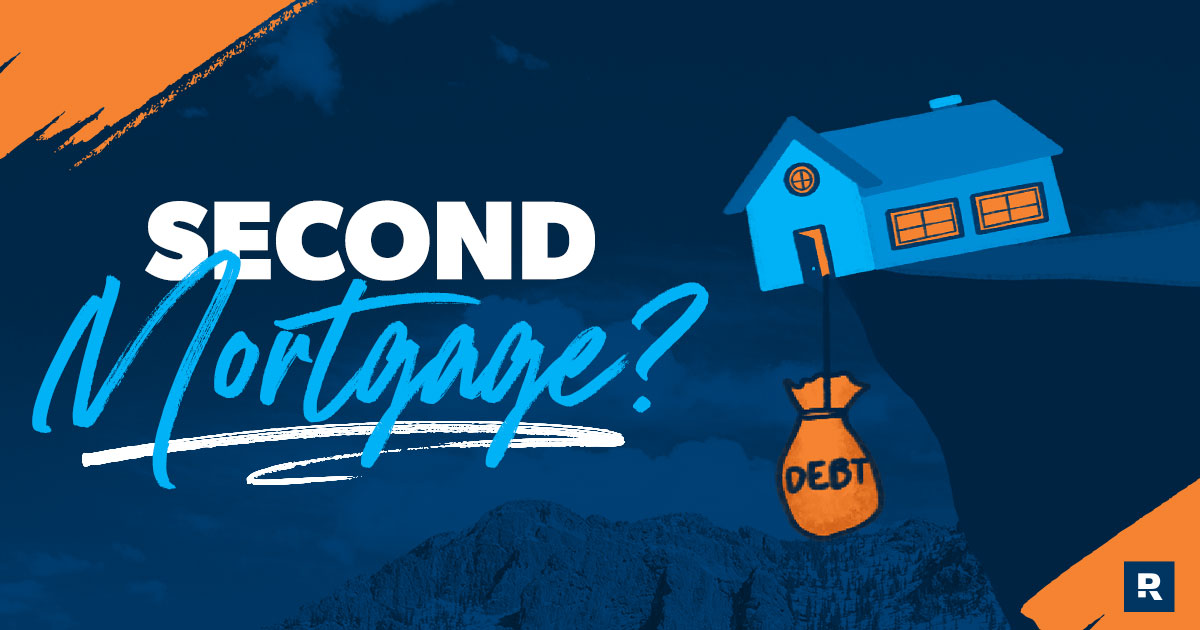What Is a Second Mortgage and How Does It Work?
9 Min Read | Dec 11, 2024

Maybe this has happened to you.
You’ve been steadily paying off your mortgage when suddenly, you start getting letters from lenders inviting you to take out a second mortgage. "Build wealth!" they say. "Pay for your education! Renovate your house!"
The promises are tempting and the money seems legitimate. It can’t be too risky, right?
Hold up! Before you get yourself in another mortgage bind, let’s take a closer look at second home mortgages and why they’re not worth it.
What Is a Second Mortgage Exactly?
A second mortgage is when you sacrifice your own home equity (by turning it into a loan) in exchange for a faster way to pay off other debts, complete home improvement projects, or buy something you couldn’t otherwise afford.
But it’s debt. You must pay it back. And since a second mortgage is secured by your home, you’ll lose your house if you don’t pay it back. That’s some scary stuff.
What Is Home Equity?
Unless you’ve paid off your mortgage, you don’t technically own your whole house. You own a portion equal to the amount you’ve paid. Home equity is that portion of your house that’s truly yours.
It’s pretty simple to calculate: Just subtract your mortgage balance from the market value of your home.
For example, say your home was valued at $250,000 and you owe $150,000 on your mortgage. To figure out your equity, you’d just subtract $150,000 from $250,000. That means your home equity would equal $100,000.
But that’s assuming the market value of your home has stayed the same. More often than not, the market value fluctuates, so your equity will too, depending on which way the market blows.
How Does Home Equity Turn Into a Second Mortgage?
Well, here’s what happens: A homeowner says, "You know what? I have $100,000 in equity. Why can’t I turn that $100,000 into money I can use to pay off my student loans, renovate my house, or go on vacation?"
Low and behold, some lender thinks that’s a great idea and replies, "You’ve got yourself a deal!" The lender agrees to give the homeowner their equity if the homeowner promises to pay them back with interest—or hand over their house if they don’t.
And voilà! Just like that, home equity turns into a second mortgage.
Second Mortgage vs. Refinancing: How Are They Different?
Now be careful not to confuse a second mortgage with a refinanced mortgage. A second mortgage comes with a second monthly payment along with your current monthly payment.
Meanwhile, refinancing means you’re replacing your current mortgage with a new mortgage that has a different set of terms—so you stick with only one monthly payment.
With a second mortgage, your primary lender holds the lien (the rights to your house)—so if you stop making payments (default), they can take back your house (foreclosure).
Your second lender only gets their money back if your primary lender gets all their money back from auctioning off the house.
All this to say, your second lender is taking on a higher risk and will probably charge you a higher interest rate as a result compared to doing a refinance.
Are Second Mortgage Rates Higher?
Did you catch that? Second mortgage rates are notoriously higher than those of a refi—and of a primary mortgage! In other words, second mortgage rates are expensive and keep you in debt longer.
Meanwhile, you’re not (usually) going further into debt with a refi. In fact, if you refinance the right way for the right reasons (a better interest rate and a shorter term), you’ll save tens of thousands in interest and pay off your house sooner.
Get the right mortgage from a trusted lender.
Whether you’re buying or refinancing, you can trust Churchill Mortgage to help you choose the best mortgage with a locked-in rate.
Types of Second Home Mortgages
Let’s look at two forms of second mortgages:
- Home equity loan. With a home equity loan, your lender gives you a stack of money based on your equity, and you repay the lender every month. Because it’s a one-time lump sum, home equity loans come with a fixed interest rate, so monthly payments don’t change.
- Home equity line of credit (HELOC). A HELOC is when your lender allows you to borrow a large amount of your equity—but not as a lump sum. It’s more like a credit card where you have a borrowing limit, and you only pay for the amount you borrow. After the borrowing time frame has ended, you must pay off your account—or else your lender will take your house!
What’s Required to Get a Second Mortgage?
Remember, second mortgages are risky for lenders because if your home is foreclosed, the lender of your first mortgage gets dibs on your house. So, when it comes to issuing second mortgages, here’s what lenders will want to know:
- You have good credit. If you’ve had trouble paying off your first mortgage, good luck getting a second one. You must prove to your lender that you consistently pay your mortgage payments—otherwise, they won’t consider your application.
- You have equity. In most cases, lenders want an appraiser to look at your house and calculate your equity. While you can get a rough estimate based on how much mortgage remains and how many payments you’ve made, an appraiser will take a closer look at the market value of your home to give an accurate number.
- You don’t have a lot of debt. Just like when you applied for your first mortgage, lenders want to know you have a steady income and you’re not up to your neck in debt. Your lender will want to review your pay stubs, tax returns and bank statements.
Why Would You Get a Second Mortgage?
Here are some common reasons homeowners are tempted to get second mortgages:
To Pay Off Another Loan or Debt
Can you use a loan to pay off a loan? Yep. (Do we recommend doing this? Nope.) Many people use their second home mortgage to pay off student loans, credit cards, medical debt or even to pay off a portion of their first mortgage.
To Fund Home Improvement Projects
Can’t wait to add the backsplash in the kitchen? Always wanted a swimming pool but never had the cash? Homeowners sometimes take out a second mortgage to renovate their houses.
Dave Ramsey recommends one mortgage company. This one!
The idea is that if you renovate your house, you’ll increase the market value of your home, getting you more equity. But that idea assumes the market value of your home will go up. However, if the value of the homes in your area goes down, you’d have a major problem—and no equity.
To Make a Personal Purchase—a Big One
Though this isn’t as common as the first two, people will take out a second mortgage to buy a new car or fund an exotic vacation. But don’t fall for this! It’s just a trap for more debt.
Want More Expert Real Estate Advice?
Sign up for our newsletter! It’s packed with practical tips to help you tackle the housing market and buy or sell your home with confidence—delivered straight to your inbox twice a month!
Should I Get a Second Mortgage?
Second mortgages are tempting—but they’re just not worth it. Sure, lenders package them like a gift. But take away the inflated promises and you’ll see them for what they really are: debt repackaged as debt.
If you’re considering a second home mortgage, here are the main reasons why you should avoid them at all costs:
They Put Your Home at Risk
Your lender may act friendly when you’re applying, but miss a payment, and they won’t hesitate to take your home. Is that new backsplash in your kitchen really worth the risk of losing your house? No! It’s just a backsplash! If you can’t afford the renovation, then don’t do it.
Renovating your property to increase your home’s value is a great idea. But there are better ways of doing it than risking foreclosure. Save, save, save! There’s no better way to pay for a home renovation than to budget for it and pay in cash.
They Can’t Turn Equity Into Cash
Second mortgages turn equity into debt. Despite the freedom they seem to give you, you must pay that money back. Second mortgages put you and your family farther into the hole of debt.
They Put a Strain on Your Income
By taking out a second mortgage, you become more vulnerable to a financial crisis. You may be able to make the payments now, but if you lose your job or end up with a large medical bill, you could easily find yourself buried under too much debt.
You may think second mortgage rates aren’t that bad. But when you add up all the costs—appraisal fees, application costs, closing costs—you’re not saving money.
How to Get Rid of a Second Mortgage
If you took out a second home mortgage but now you’re following Ramsey’s 7 Baby Steps, you might wonder at what point you should pay it off. Should you count it in your debt snowball and pay it off in Baby Step 2? Or should you refinance it into your first mortgage and pay it in Baby Step 6?
If your second mortgage is less than half your annual income, treat it as debt and pay if off in Baby Step 2. Don’t refinance it. Paying it off isn’t unreasonable—so long as you make it a goal and stay focused.
However, if your second mortgage is more than half your annual income, refinance it as part of your first mortgage and pay it off in Baby Step 6. Take care of your smaller debts and work your way to paying off the larger debt.
Need Help With a Mortgage?
For more help in making a smart decision when it comes to mortgages, talk to a good home loan specialist. For an easy way to find one we trust, connect with our friends at Churchill Mortgage. Like us, they actually care about helping you pay off your house as fast as possible.
Did you find this article helpful? Share it!

We Hear You!
We’re considering adding the ability to save articles to your Ramsey account.




